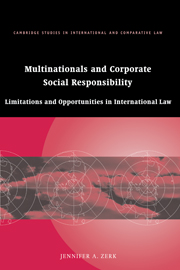 Multinationals and Corporate Social Responsibility
Multinationals and Corporate Social Responsibility Book contents
- Frontmatter
- Contents
- Preface
- Table of treaties, declarations and other international instruments
- Table of cases
- Table of statutes and statutory instruments
- List of abbreviations
- Introduction
- Part I Regulatory issues and problems
- Part II Home state regulation of multinationals
- 4 New directions in extraterritorial regulation of CSR standards
- 5 Private claims for personal injury and environmental harm
- Part III International regulation of multinationals
- Bibliography
- Index
- CAMBRIDGE STUDIES IN INTERNATIONAL AND COMPARATIVE LAW
5 - Private claims for personal injury and environmental harm
Published online by Cambridge University Press: 23 July 2009
- Frontmatter
- Contents
- Preface
- Table of treaties, declarations and other international instruments
- Table of cases
- Table of statutes and statutory instruments
- List of abbreviations
- Introduction
- Part I Regulatory issues and problems
- Part II Home state regulation of multinationals
- 4 New directions in extraterritorial regulation of CSR standards
- 5 Private claims for personal injury and environmental harm
- Part III International regulation of multinationals
- Bibliography
- Index
- CAMBRIDGE STUDIES IN INTERNATIONAL AND COMPARATIVE LAW
Summary
To what extent does domestic law, as enforced by domestic courts, provide a means of obtaining redress against multinationals for loss or damage arising from poor health, safety or environmental standards overseas? Until recently, the experiences of plaintiffs in national courts had not been very encouraging. However, a series of pro-plaintiff decisions (of which the House of Lords decision in Lubbe v. Cape plc is a good example) have re-ignited interest in the regulatory possibilities afforded by private claims.
Cases like Re Bhopal and Lubbe v. Cape plc dramatise very clearly the potential dangers of an ‘unregulated’ international system, in which multinationals can dump their most hazardous activities and processes on poorer countries, safe in the knowledge that they are unlikely to be required to compensate their victims fully, if at all. Given the lack of enforcement machinery at international level, it is not surprising that plaintiffs are now exploring the potential of private claims under domestic laws to hold multinationals to account. The past decade or so has seen a sharp increase in the number of ‘foreign direct liability’ (‘FDL’) claims, that is, claims brought in home state courts that target, not the subsidiary, but the parent company as the apparent ‘orchestrator’ of company-wide investment standards and policies. So far, a number of prominent home states have been affected – including the UK, the USA, Australia and Canada – and there is no reason to expect that it will stop there.
- Type
- Chapter
- Information
- Multinationals and Corporate Social ResponsibilityLimitations and Opportunities in International Law, pp. 198 - 240Publisher: Cambridge University PressPrint publication year: 2006
